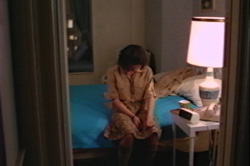Part of Winter 2009
Internal Archivists brings together video artists Aleesa Cohene and Dani Leventhal for a screening of their works and a conversation about their individual practices with artist, writer and curator Brenda Goldstein. The program will feature excerpts from Cohene’s new work, Something Better, along with her previous, widely acclaimed videos Absolutely (2001), Ready to Cope (2006) and Supposed To (2007), and Leventhal’s new 90 in 90, as well as her compelling earlier works Draft 9 (2003), Litau (2007) and 3 Parts for Today (2007). The artists will also each screen works by other artists, including Young-Hae Chang’s Cunnilingus in North Korea (2005) and Alpsee (1995) by Matthias Müller.
Aleesa Cohene has been making carefully crafted videos from found footage since 2001, displaying a deft ability to suture disparate samples of 70s and 80s cinematic ephemera into sharp, visually seamless narratives. Her works are audiovisual embroideries that reveal the political gradients and received knowledge accumulated in the collective unconsciousness.
Each of Dani Leventhal’s carefully crafted images forms a page in her diary, at which her keen editing allows the audience only brief glances. Her video collages are part travelogue, part interview and part sketchbook of the artist’s musings. The cast varies: repentant Israeli soldiers, dying birds, goats, cows, family members, windmills, lovers, strangers found in town squares and on commuter trains. Leventhal’s cascading images accumulate like life’s experiences and coalesce to form a personal grand narrative.
Cohene and Leventhal both assemble their work from vast archives of accumulated material. Cohene’s archive is made of found footage, Leventhal’s archive is made of material she has shot herself. Each artist struggles with belief and ideology — together their works map out an uneasy middle ground, illustrating how the personal becomes the political, and how distanced analysis becomes the personal.
